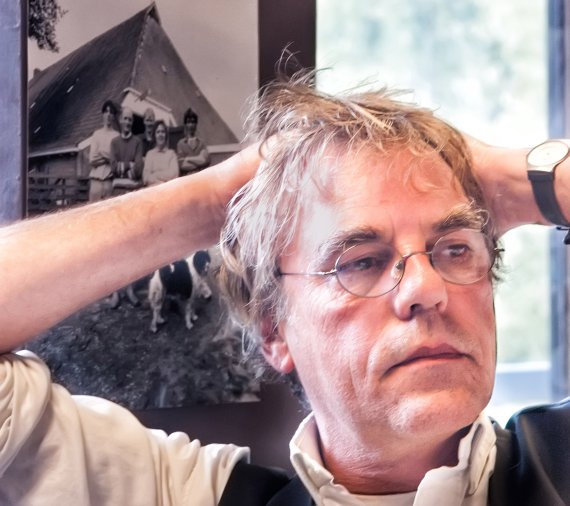photo Guy Ackermans Friesland
Jan Douwe van der Ploeg comes from Akkerwoude in northern Friesland, a poor area formerly inhabited by many peasant farmers and farm labourers. His grandfather managed to work his way up from migrant farm labourer to a small-scale livestock farmer with a cow and a pig – at that time a minimum requirement for being allowed to lease land or to marry and start a family. His grandparents worked hard to expand their farm and were able to send one of the sons to train as a teacher. He became a schoolteacher in the village and was able in turn to send a son to the Agricultural College in Wageningen. This personal history was formative for Jan Douwe as a student and a researcher: for him, farming meant emancipation, hard work and the struggle of proud rural men and women for land, income and property.
The socialist
As a student in Wageningen from 1968, Van der Ploeg often went into the Betuwe district in search of revolutionary farmers, thus laying the foundations for the student organization Boerengroep, which still exists today. He also joined the University Socialist Union (USU). At Economics lectures, the USU sat as one bloc at the front of the class, as illustrator Loet van Moll records in the farewell magazine Jan Douwe. Before the lecture had really got going, their leader Jan Douwe would stand up and start to inveigh – in his characteristic sonorous voice – against ‘backward and limited’ classical economics. His relations with the Wageningen economists were always difficult. The economists accuse him of research results that are often not supported by solid data. In turn, Van der Ploeg thought the economists denied the role of power factors and were too much under the thumb of market thinking and the ideal of modernization.
The revolution
The degree programme Non-western sociology gave Van der Ploeg a good excuse to visit countries where the revolution was dawning. First he did fieldwork in the mountains of Peru and Colombia, and then he contributed to the reconstruction of the recently liberated Portuguese colony of Guinea-Bissau, where the Angola Committee ran health projects and worked towards the creation of self-sufficient village economies. Van De Ploeg’s assignment was to formulate the sociological basis for these interventions. The field research meant talking to a lot of peasant farmers and villagers by day, discussing the results over a beer in the evening, and writing them up at night. The aim: emancipation and autonomy for peasant farmers.
Peasants
But Jan Douwe was no communist. After all, his subject – the farmer – had just as much to fear from communism as from capitalism. Neither ideology knew what to do about the ‘peasants’, small-scale family farmers, and they both had programmes for improving and modernizing them, turning them into state farm workers or entrepreneurs. Van der Ploeg believed – and still does – that we should take farmers as we find them and learn from them. In his view, agronomy is ‘what farmers do’ and not ‘what farmers should do’ according to policymakers and scientists.
Farming styles
Van der Ploeg’s research on what farmers do in various different cultures provided the basis for the most important social-scientific concept in post-war Dutch agriculture. Jan Douwe, by now professor of Rural Sociology, identified different styles adopted by farmers, such as those of the thrifty farmer, the cattle farmer and the machine farmer. He gave farmers an identity with these labels and described various development pathways for Dutch agriculture and European rural policy. Van der Ploeg became a key agricultural and rural advisor, but remained non-conformist and critical of agricultural policy. This faithfulness to his principles earned him the accolades of ‘non-opportunist’ and ‘worthy professor’ from the former professor of Cooperative business administration Gert van Dijk.
The romantic
Yet Jan Douwe was also seen as a romantic. Columnist Vergaderboer described him in sector magazine Boerderij at the end of 2013 as a piece of ‘furniture’ that need to move on. ‘Van der Ploeg is stuck in romanticising the past. He still sees agriculture through the eyes of the previous generation. Small farms which sell their own products and expand a little bit. Farm campsites and that sort of thing. Fiddling about on the margins of a good income. (…) His conservative voice sounded loud and clear for a number of years, raising hopes among farmers who shared his faith in small-scale farming. A misleading voice. In spite of all Professor Van der Ploeg’s testimony, the upscaling is going ahead and at increasing speed. You could say he was a voice crying out in the wilderness. And that is probably why he has gone quiet. We don’t hear much from him anymore.’
The wandering teacher
Jan Douwe sometimes called himself a ‘wandering teacher’, referring to the German experts who trekked through the countryside in the 19th century, lecturing to groups of farmers. These teachers combined farming knowledge with their own empirical knowledge and passed this on walking from village to village. Jan Douwe was a gifted speaker who shared his vision in many a village pub, chatting afterwards with the farmers he met there. The world outside Wageningen was where things really happened, he often said. But in the last decade he spent less time in the Dutch countryside and worked a lot more in Brazil and China, countries which have large peasant populations and are undergoing fast economic development. Ideal conditions for unorthodox analyses from the point of view of the small-scale, hardworking farmer.

